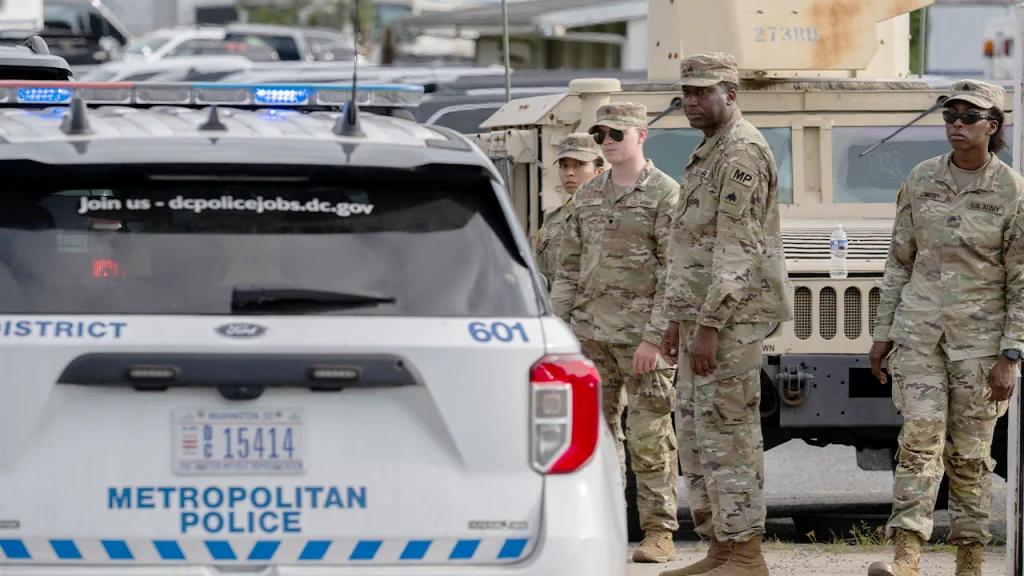National Guard Helps Break Up Violent Street Brawl in D.C.
In a tense confrontation that unfolded Wednesday evening in Southeast Washington, D.C., members of the National Guard found themselves intervening in a violent street altercation that ended with two arrests and one man being treated for a knife wound. The incident, which occurred just before 8 p.m., saw 31-year-old Tiana Robinson charged with assault with a dangerous weapon, while 29-year-old Kenneth Evans faces simple assault charges, according to the Metropolitan Police Department (MPD). This violent episode highlights the ongoing public safety concerns in parts of the nation’s capital, where law enforcement and now military personnel find themselves responding to street-level violence.
The confrontation began innocuously enough – a man and his cousin were simply leaving a restaurant and heading toward the Navy Yard Metro Station when they noticed they were being followed by Robinson and Evans. What might have been a minor verbal disagreement quickly escalated when, according to witness statements in court documents, Evans allegedly struck the victim’s cousin “out of nowhere” with a closed fist. When the man stepped in to defend his cousin, the situation took a dangerous turn. Robinson allegedly pulled out what was described as a 12-inch kitchen knife and swung it at the intervening man, causing a deep laceration to his palm that required treatment at Howard University Hospital. The sudden transformation from a verbal dispute to a potentially life-threatening assault happened in moments, underscoring how rapidly urban conflicts can escalate.
The National Guard’s involvement in breaking up this street fight represents an unusual intersection of military and civilian law enforcement duties. According to court documents, Guard members who were patrolling the area witnessed the fight in progress and immediately moved to intervene, helping to separate the combatants and restore order. Their presence proved fortuitous, as they were able to respond alongside MPD officers who had been flagged down by a concerned citizen. Multiple witnesses confirmed to police that they had observed one of the suspects wielding a knife during the altercation, though responding officers were only able to find a blood trail at the scene, with the weapon itself nowhere to be found. This cooperation between military personnel and local law enforcement illustrates the complex security situation currently existing in parts of Washington, D.C.
The incident comes amid heightened concerns about violent crime in the District, including in neighborhoods previously considered relatively safe. Recent weeks have seen other high-profile violent incidents, including homicides, that have put communities on edge and prompted debates about public safety policies. This latest stabbing, occurring in a public space near transportation hubs used by thousands of commuters daily, adds to the perception that violence can erupt anywhere in the city. The presence of the National Guard, which typically responds to natural disasters or civil unrest rather than individual street fights, speaks to the extraordinary measures being employed to address safety concerns in the nation’s capital. Their involvement raises questions about resource allocation and the appropriate role of military personnel in urban policing contexts.
For the individuals involved in Wednesday’s confrontation, the consequences now extend beyond physical injuries to potential legal ramifications. Robinson faces the more serious charge of assault with a dangerous weapon, which could carry significant penalties if she is convicted. Evans’ charge of simple assault, while less severe, still represents a serious legal matter that could result in fines or jail time. Court documents reveal the details of the investigation, including witness statements and the victim’s account of being attacked with what he described as a foot-long kitchen knife. These judicial proceedings will ultimately determine the legal responsibility of the accused, though they cannot undo the trauma experienced by those involved in the violent encounter.
This incident reflects broader challenges facing urban communities and law enforcement agencies nationwide. The quick escalation from verbal dispute to knife violence exemplifies how interpersonal conflicts can rapidly transform into dangerous confrontations that require emergency response. The involvement of the National Guard in what might otherwise be considered a routine police matter also raises questions about resource allocation, public safety strategies, and the boundaries between military and civilian law enforcement responsibilities. As Washington, D.C. continues to grapple with public safety concerns, incidents like Wednesday’s stabbing serve as stark reminders of the complex interplay between individual behavior, community safety, and institutional responses to violence. For residents and visitors alike, such events underscore the unpredictable nature of urban environments and the ongoing challenges faced by those tasked with maintaining public order.


